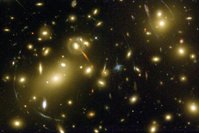
The issues in conflict pile up: Where did humans come from? How was the universe created? When does individual life begin? What role does religion have in mankind's understanding of the universe? These are the questions that have piqued mankind's curiosity since the earliest days. Originally, it was faith in the mystical that informed our understanding. However, after years of studying the world around us, science, reason and logic, have become our preferred ways of tackling these fundamental quandaries.
But that may be changing. From Reuters, via RedNova News:
A bitter debate about how to teach evolution in U.S. high schools is prompting a crisis of confidence among scientists, and some senior academics warn that science itself is under assault.
[snip]
"Among the most significant forces is the rising tide of anti-science sentiment that seems to have its nucleus in Washington but which extends throughout the nation," said Stanford's Philip Pizzo in a letter posted on the school Web site on October 3.
Social conservatives have made it a central part of their political policy to challenge science in the public arena. Issues such as evolution, universal genesis, global warming and stem cell research, to name a few, are seeing renewed attempts at explanation via pre-Englightenment religious ideology.
"When ideological division replaces informed exchange, dogma is the result and education suffers," [acting Cornell President Hunter Rawlings] said.
The education issue is what is key, I believe. The continued effect of the phony "Evolution vs. Intelligent Design Creationism" debate is a very visible example of the push to replace science with medieval religious literalism.
The danger from this is twofold: first, as Rawlings notes, educational standards suffer:
"When we ask people what they know about science, just under 20 percent turn out to be scientifically literate," said Jon Miller, director of the center for biomedical communication at Northwestern University.
He said science and especially mathematics were poorly taught in most U.S. schools, leading both to a shortage of good scientists and general scientific ignorance.
U.S. school students perform relatively poorly in international tests of mathematics and science. For example, in 2003 U.S. students placed 24th in an international test that measured the mathematical literacy of 15-year-olds, below many European and Asian countries.
The second danger is that it creates a situation where people become antagonistic against science and believe that it is actually a danger to cultural values:
Brown University biologist Kenneth Miller believes the rhetoric of the anti-evolution movement has had the effect of driving a wedge between a large proportion of the population who follow fundamentalist Christianity and science.
"It is alienating young people from science. It basically tells them that the scientific community is not to be trusted and you would have to abandon your principles of faith to become a scientist, which is not at all true," he said.
As I've said in several previous posts: there is nothing scientific about intelligent design. It's just the creation myth dressed up to sound pseudo-scientific, not unlike astrology or phrenology. But the new resurgence of Biblical literalism in the United States also affects other widely held scientific theories, such as Big Bang cosmology. Scientific theories like Evolution and the Big Bang are not lacking in "established facts" or "filled with gaps" as some school boards, like Dover, PA, claim. Even saying so demonstrates a fundamental ignorance of the scientific method, not to mention the theories themselves. How can any school properly teach science when the school board doesn't even understand what is being taught?
Or, more importantly, why it needs to be taught?
With many controversial issues involving particularly medical science on the horizon, such as stem cell research, human cloning and beginning- and end-of-life issues, it is now more imperative than ever that our public schools return religious ideology to its proper place.
The science classroom is not it!


No comments:
Post a Comment